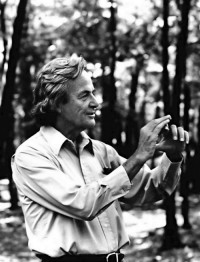By James Dacey

Richard Feynman. (Courtesy: Fermilab)
Richard Feynman – undoubtedly one of the greatest scientists of the 20th century – died 25 years ago this year. To mark the passing of this physics and cultural icon, the BBC and the Open University have teamed up to produce two television programmes about Feynman’s life and work. The first programme aired in the UK on Monday, a docudrama called The Challenger portraying the role Feynman played in the investigation into the causes of the Challenger disaster. Readers in the UK can watch the programme here. Later this year, the BBC will broadcast a documentary about Feynman’s life.
I enjoyed Monday’s drama. I thought William Hurt did an excellent job of playing a smart and humane Richard Feynman, without over-cooking the “eccentric bongo-player” aspects of Feynman’s personality. Hurt certainly earned his wages, as the plot focused almost exclusively on how the Nobel laureate navigated his way through the alien world of high-level US politics, with all its game-playing and vested interests. My only criticism would be that because the film was so intensely focused on Feynman’s moves and responses, we didn’t really get to know any of the supporting characters.
Most of the action centres around Feynman’s efforts to work out why the Challenger shuttle exploded on the morning of 28 January 1986 just 73 seconds into its flight, killing all seven crew members. It is a journey made even harder by the fact that Feynman is a Washington outsider who is himself battling with cancer (Feynman died on 15 February 1988). As well as the disease, Feynman is also battling with his conscience. Having been involved in a public service of sorts – developing the atom bomb in the 1940s – Feynman comes to see the Challenger inquiry as an opportunity to bring about a more positive sort of outcome.
Just in case the Challenger affair is an episode of history that managed to pass you by, I’ll issue a **spoiler alert** here. Following the events of the real investigation, Feynman’s brilliance shines through as he gets to the bottom of the case. Using his unrivalled knack of cutting through the haze of technical jargon, Feynman shows why the launch should never have taken place on such a cold day. He demonstrates, during a televised hearing, the structural failure of one of the craft components known as the O-ring seals, by simply dipping a section of it into a glass of ice water. This audacious episode in Feynman’s life helped to seal his reputation as one of the finest scientists, and science communicators, in living history.
In this week’s Facebook poll, we want you to answer the following question:
Should more leading scientists engage in public service?
Yes
No
Please feel free to explain your response by posting a comment, either on this blog or on the Facebook poll.
In last week’s poll we asked you a question relating to the heavens. We asked: “Which astronomical objects do you find the most fascinating?” From a list of five options, the most popular choice was black holes, with 35% of the vote. The other choices were: quasars (23%); pulsars (13%); exoplanets (9%) and supernovae (8%). The remaining 12% of people selected the “other” option, with supervoids and cosmic strings among the exotic suggestions.
Thank you for taking part and we hope to hear from you again this week.
Trackback: Challenger and Public Policy: Redux | Futuresmiths
In the modern society more and more influenced and operated by the deeper and deeper scientific knowledge and knowhow,it is the social duty for the scientists and engineers and other competent elements to connect with the civil society for clear cut information as an educational tool. Without this, the superficial knowledge thrown around either deliberately for narrow ends and out of ignorance by the media, the political world or interested lobbies will pile up as devastating ignorance as is already happening around us.
A Beppe Grillo for the survival of research: scientists, don’t complain about sequester, you’d been warned http://wp.me/p3gBgY-1Z
Trackback: Blog - physicsworld.com